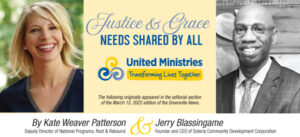Uniting for Change: Justice & Grace Needs Shared By All

“Each of us is more than the worst thing we’ve ever done.” This Bryan Stevenson quote should resonate with every human – none of us wants to be defined by the worst thing we’ve done, because we have all done harm. We have hurt people we love. We haven’t been honest. We have looked out for ourselves at the expense of others.
Most people are privileged enough not to be defined by their worst action. But as two people who work with people who have criminal records, we know that America doesn’t extend that same privilege to those who have been in the system. So often we define those who have been involved in the criminal system only by what they have done. I (Jerry) often say, “I’ve learned a very sobering lesson: In America, when you commit a crime, no matter how small, the punishment is tantamount to a life sentence.”
A criminal record of any kind follows a person wherever they go and impacts every aspect of their life: chances for employment, access to safe and stable housing, access to their children. Not only does a criminal record follow a person, it changes how we speak about them. We call people with records “ex-convicts” or “ex-felons.” We don’t call people who are inside our prisons “incarcerated people”—we call them “inmates.” Language matters. The language that we use to describe those in the system, who are disproportionately poor and disproportionately people of color, is inherently dehumanizing.
So often, we do not think of these people as a neighbor or colleague, as a father or daughter, a sister, or a husband. But people who have been part of the criminal system are all those things. The failure to recognize a whole person, and how their lives and circumstances may have impacted their path to the legal system, means that we are able to treat those people as less than human and less than equal.
Our organizations, Soteria and Root & Rebound, seek to lift and empower those who have been impacted by mass incarceration. In doing so, we hope to redefine what justice means in our criminal system.
Too often in this country, justice in the criminal system (or lack thereof) has been defined by the amount of money someone has or the color of their skin. We lock people up, often children or very young adults. We offer extraordinarily little in the way of rehabilitation inside of our correctional facilities. We release people with substantial fines and fees hanging over their heads, and little more than a bus ticket. People struggle to find a job and a home; they feel hopeless and often return to the same circumstances that initially landed them in the system.
Through Soteria’s wrap-around services for incarcerated men and women, and Root & Rebound’s legal services for those who have been system impacted, we are disrupting this cycle. We see the human behind the conviction and help them become who they can be when given the support that they need.
Because incarceration and system involvement touch every aspect of people’s lives, we can’t do this work alone. Our partnership with United Ministries enables us to offer access to GED services, employment counseling and financial wellness to our clients. UM’s mental health counselor provides critical mental health support to clients. United Ministries’ staff understands the burdens and barriers that our clients face, offering compassion, wisdom, and experience. With our reciprocal referral relationship, the services we all offer are as holistic, robust, and efficient as possible.
We must shift how we think about and how we treat people who have committed crimes in order to effectuate real justice, and to make our communities safer for all. Soteria, Root & Rebound and United Ministries are working together to achieve that vision.
As we will likely hear Bryan Stevenson repeat when he keynotes United Ministries’ upcoming Uniting for Change Luncheon on April 13th, “[i]t’s necessary to recognize that we all need mercy, we all need justice, and — perhaps — we all need some measure of unmerited grace.” Join us in extending that grace—we all could use it.
Learn more about the Uniting for Change luncheon at united-ministries.org.
